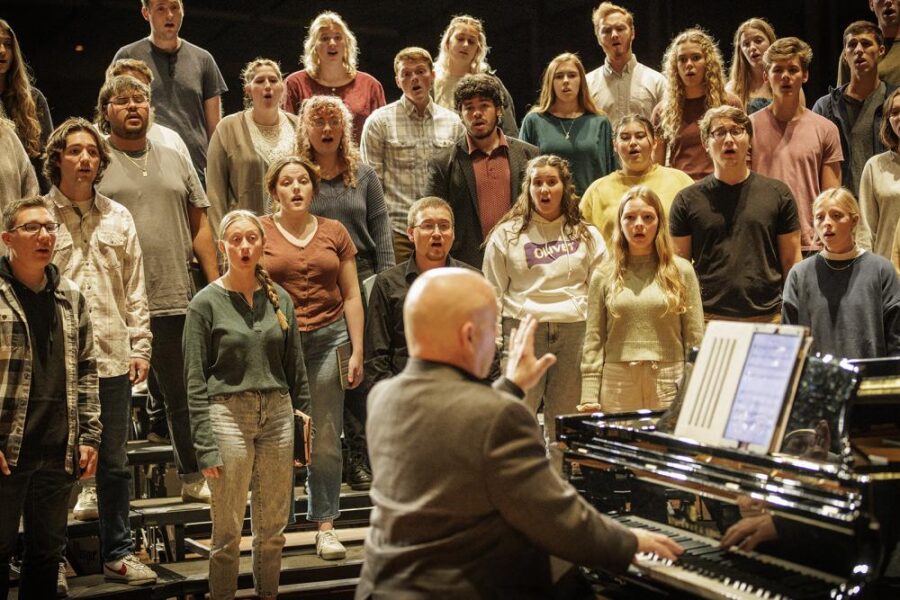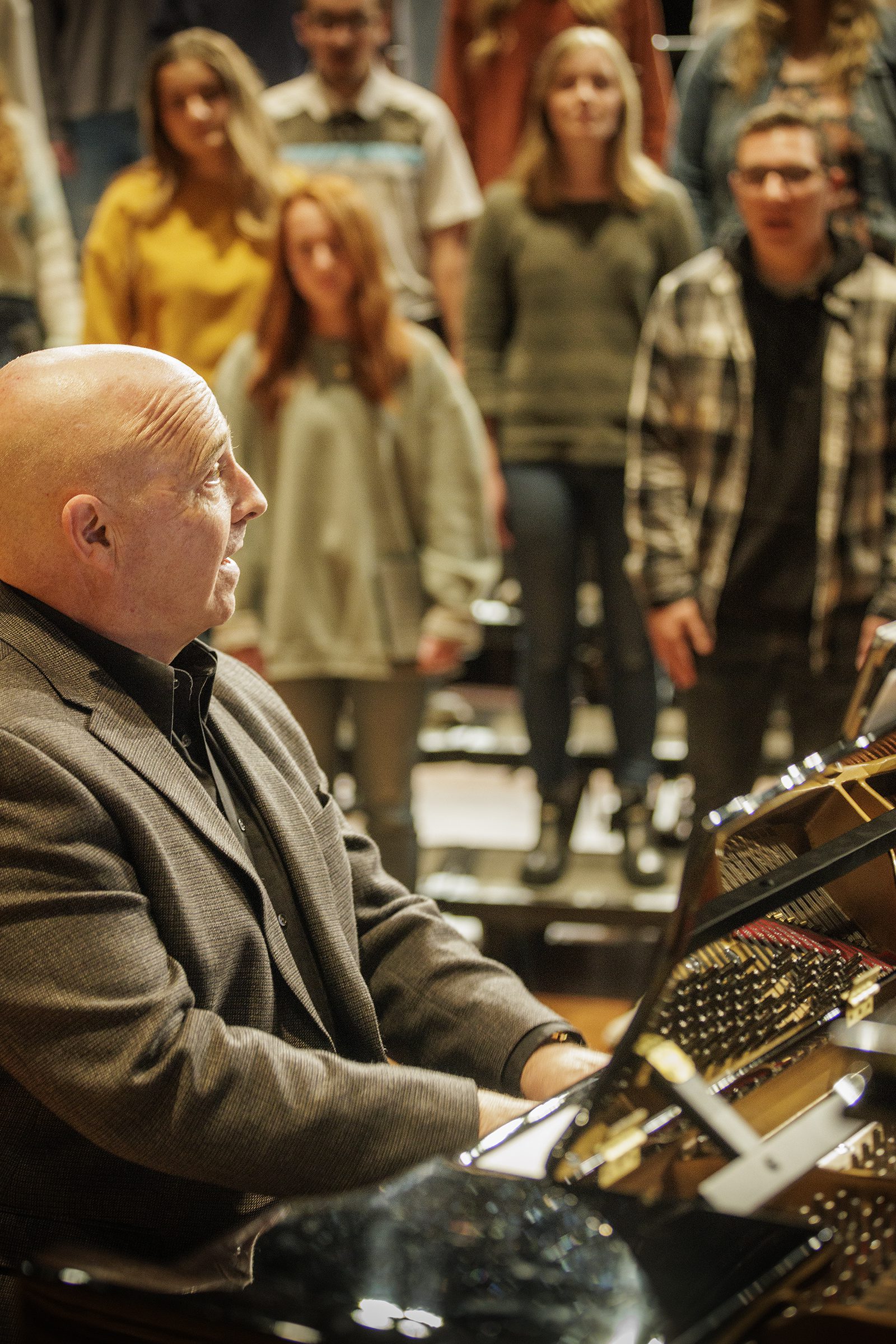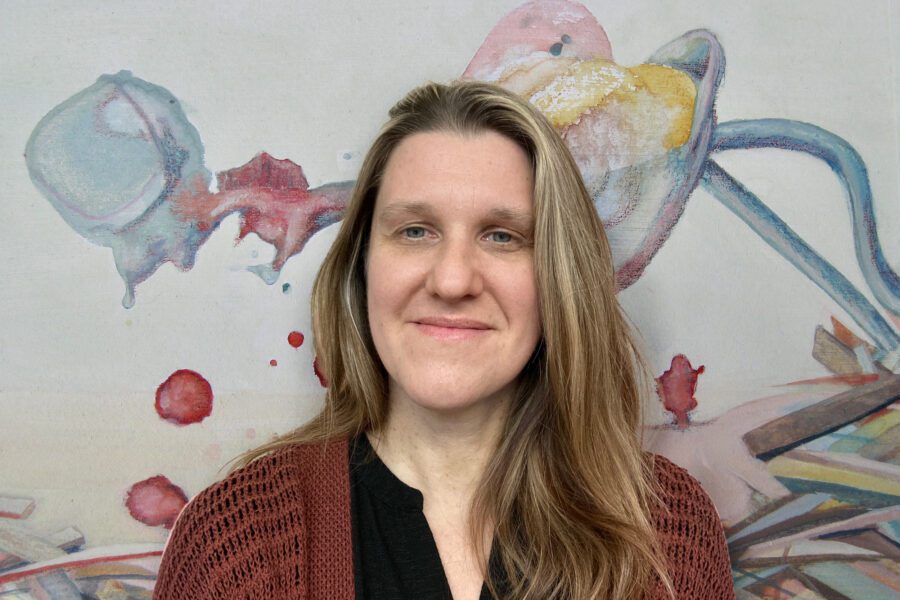
Dr. Jeff Bell
Arriving at Olivet in 1977, everything was new to me. As a Music Education major I needed to sing in a choir, so I signed up for an audition with Dr. George Dunbar. I hadn’t heard Orpheus Choir myself, but I knew some former members. A couple days later I was in the choir, and that first rehearsal in Chalfant Hall began a life-changing journey. Former members of the choir often describe it as a “family,” and in any family, you learn some things along the way.
1. I learned right away from Dr. Dunbar that decibels do not equal leadership. In the years I knew him, I never heard him raise his voice to get or maintain attention. He was not loud, but there was never any question that he was in charge.
2. Preparation is important. Of course, a choir conductor—or any leader—should be prepared, but group members also contribute and receive more when they are prepared. I was always expected to have some things practiced for the next rehearsal.
3. Share the vision. I didn’t always know all the details for upcoming performances, tours, etc., but Dr. D. made sure we knew his expectation of quality.
4. Remember to laugh. Sometimes funny things happen, and it denies our humanity to pretend otherwise. It’s possible to avoid chaos while still having a good time learning music, or anything else!
5. There is value to conformity. Certainly, God sees us as individuals. But singing high quality choral music requires that members put aside a portion of their individuality to blend with other singers, producing something extraordinary that none of us could do on our own. (I think there’s a decent “body-of-Christ” metaphor there.)

6. Listening is important. In Orpheus Choir I was encouraged to listen to parts other than just the one I was singing. It helped us stay in tune and to get a better idea of the total sound. Today, I have Orpheus Choir perform much of the time in a “mixed” standing arrangement, so that each singer is constantly aware of the other parts. It can be challenging, but it’s worth it.
7. As a student, I was impressed that Dr. Dunbar did not try to do everything himself. He trusted choir members to lead in areas where they had particular skills, and that helped foster a feeling of ownership among the choir. I have learned over the years that it’s difficult to delegate, but doing so can develop leadership skills in others. (Note: One of those student leaders would later become my wife. Yay!)
8. I had a wonderful high school choir experience, yet being in Orpheus Choir exposed me to new musical styles. Though not every piece became my favorite, I learned to appreciate the variety. Actually, some of those pieces that I didn’t like at first began to grow on me. One time Dr. Dunbar advised me to be a little wary of pieces that I liked instantly—they might turn out to be flashy but shallow.
9. Although Orpheus Choir was—and is—a huge part of my life, it shouldn’t be the most important part. I saw modeled in my conductor an order of priorities: God first, then family, then other things. What I do is not who I am.
10. Being in Orpheus Choir helped me see that what we do with our talents (God’s gift to us) can be a part of our worship (our gift to God.) Performing music with excellence can truly be an offering of praise.
Dr. Bell has served as professor of music at Olivet Nazarene University since 1997, and he is the conductor of ONU’s Orpheus Choir. Other teaching responsibilities include beginning conducting; voice literature and pedagogy; 20th century American popular music; senior seminar; and sharing responsibilities conducting the annual performances of Handel’s “Messiah.” He came to this position after 13 years on the music faculty at Indiana Wesleyan University.
He has produced and conducted three albums of sacred music with Orpheus Choir: “A Mighty Fortress,” “Great Is Thy Faithfulness” and the a cappella Christmas album, “Love Came Gently.” He is the organist for College Church of the Nazarene in Bourbonnais. He is a frequent adjudicator and clinician for choral and instrumental clinics and competitions. He has performed in recitals, opera and oratorio; and is a published composer and arranger.
He and his wife, Carole ’81, have two grown daughters and two grandchildren.
To learn more about The School of Music at Olivet Nazarene University, contact the Office of Admissions at admissions@olivet.edu or 800-648-1463.
Published 3/21/2023




